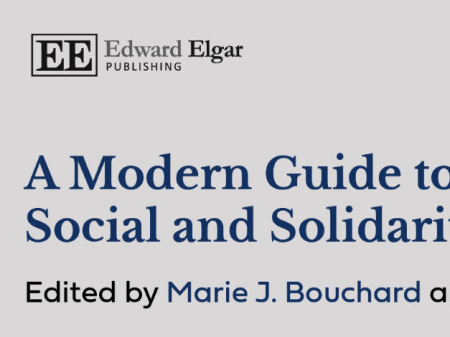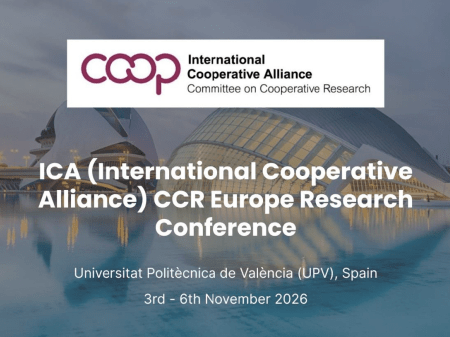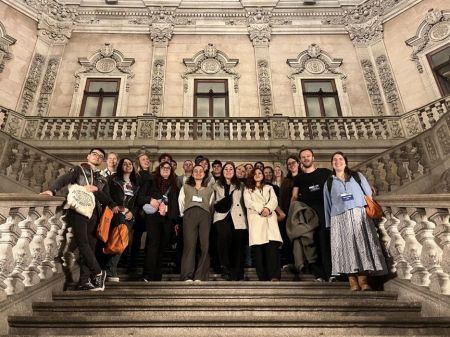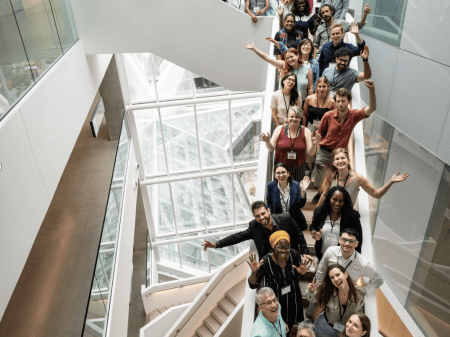We are pleased to share news of a new book relevant to…
ICA-CCR-YES Workshop ICA CCR Global Research Conference - Intercooperation for our common futures Montréal, Canada
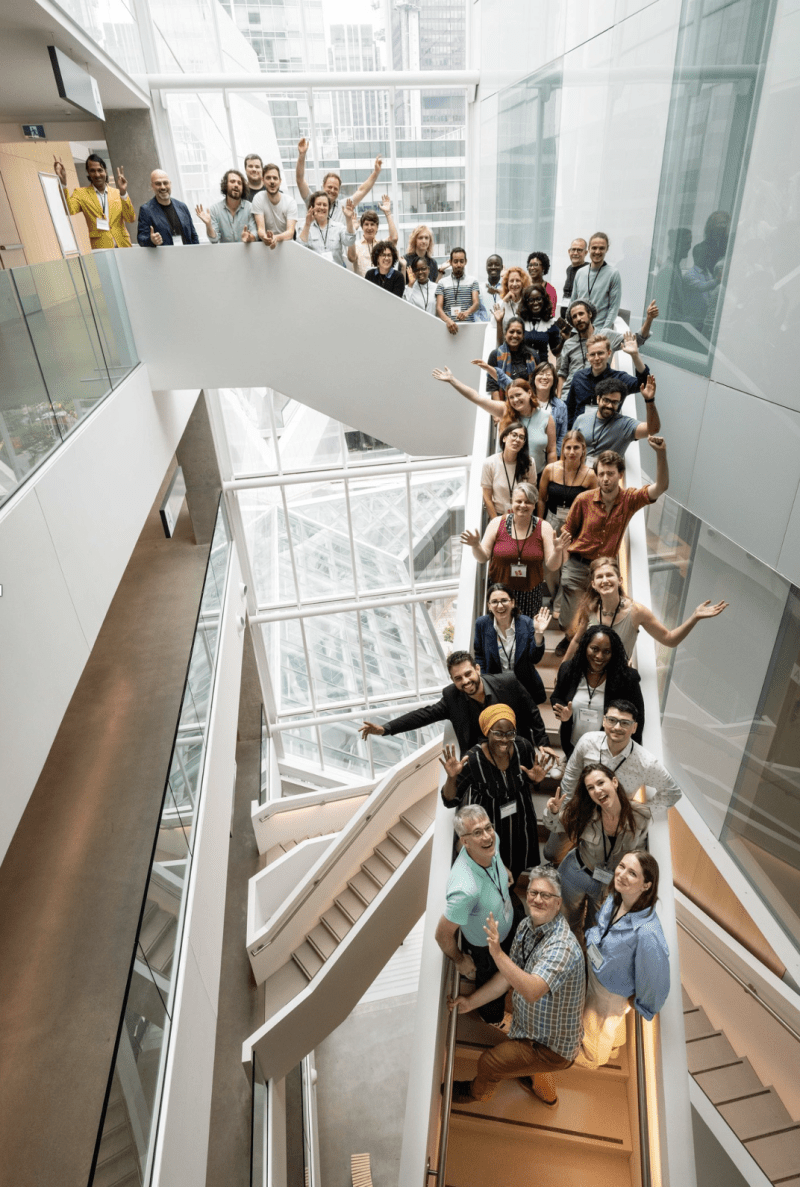
By Aldana García Tarsia and Asia Guerreschi
The International Cooperative Alliance (ICA) Committee on Cooperative Research (CCR) Global Conference Workshop was held on Monday, September 7th, at the Institut international des coopératives Alphonse-et-Dorimène-Desjardins (IICADD) of HEC Montréal, bringing together a vibrant and diverse community of cooperative scholars and practitioners. This year’s workshop centered on the inspiring theme of decolonizing cooperatives—a call to reflect on historical inequalities and to strengthen the role of cooperatives in empowering marginalized communities.
Around 35 participants from across North, Central, and South America, Europe, and Asia came together, some meeting for the first time while others reuniting, to share experiences, ideas, and activities throughout the day.
The morning opened with a warm welcome from the ICA CCR Board and the CCR-YES Network, setting a collaborative tone for the sessions ahead. The day began with remarks from Cynthia Giagnocavo (President, ICA-CCR), Camilla Carabini (ICA-CCR-YES representative), and Asia Guerreschi (serving temporarily as ICA-CCR-YES representative and speaking also on behalf of Paola Raffaeli from the INET–YSI Cooperative group).
The INET-YSI was especially crucial to fund a group of young and emerging scholars to attend the conference. The YES workshop is a crucial moment in these conferences to discover each person’s research field and humanly connect. Additionally, it supports the travel and other expenses of researchers who would not otherwise be able to attend.
To get to know each other, and bring forward the YES’s aim - bridge connections and knowledge between young researchers - the workshop was opened with an informal ice breaker on the topics of research of those present and their location of study.
The day continued with a Round Table: Learning from Experience with Q&A, titled “Revolution or Reform? The role of co-ops and radical organisations in contemporary capitalism” in which Prof. Simon Teasdale drew upon his work researching co-ops, social movements and social enterprises to leave participants with the question of whether co-ops and radical movements should lessen their principles to create a broader movement and/or to shape the mainstream.
After a short coffee break, participants joined the Workshop on Publishing and Presentations, where three scholars shared valuable insights into different stages of the research process. Devi Vijay opened the session by discussing her experience with the Peer Community in Organization Studies, a collaborative network of researchers that offers constructive feedback through a blind review process. This initiative not only provided thoughtful recommendations on the suitability of a paper for publication but also provided suggestions, such as assigning a DOI to the reviewed preprint—allowing authors to cite and showcase their work as part of their academic portfolio.
Rafael Ziegler talked about strategies on how to select where to publish our work, and also recommended uploading our documents to PortailCoop.
Luc Audebrand spoke both about publishing in the adequate journals and how to adapt to specific journal calls, and the efforts to present the cover letter well for papers to entice publishers to pick an article.
Coming back from lunch break, the second Round Table: Learning from Experience with Q&A started, with Prof. Marcelo Vieta’s presentation titled “Researching with Cooperatives, Cooperating to Change the World”. Here, Marcelo highlighted the role that cooperatives have in meeting the needs of the community they are a part of. In addition, he shared how humanity has been cooperating since ancient times, and he talked about some of the catalysts people have to create cooperatives and how this type of organization can help build a crisis-resilient world.
The day concluded with the Workshop on Manifesto, moderated by the Manifesto Task Force—Aldana García Tarsia, Karl Janelle, Paul Hernandez, Thabo Huntgeburth, Asia Guerreschi, and Deivid Forgiarini. After a short introduction outlining the progress made over the past year, the session moved into its interactive and collaborative phase.
Participants were divided into three working groups, each focused on a key dimension of cooperative research: “researchers,” “cooperatives,” and “global issues.” At each table, participants reflected on the main challenges, goals, and proposals related to their theme, contributing ideas directly onto large posters. As groups rotated between tables, discussions grew richer and more interconnected.
Among the many reflections that emerged during the Manifesto Workshop, one of the strongest was the shared ambition to influence the wider market and economic system in a positive, transformative way.
Participants emphasized the need to democratize the economy and strengthen the cooperative movement as a model capable of combining social, environmental, and economic sustainability. This vision rests on a common understanding of cooperative principles—placing members, rather than profits, at the center—and on preserving the social values that distinguish cooperatives from conventional firms. Participants also stressed the importance of ensuring economic stability, raising public awareness, and promoting climate justice and decolonization as essential goals for cooperatives that wish to drive systemic change.
The group envisioned a cooperative ecosystem that actively shapes markets and communities through both horizontal and vertical collaboration. Ideas such as cooperatives acting as mutual “watchdogs,” sharing data and good practices, and institutionalizing cooperative values within auditing and education systems were seen as crucial steps toward greater accountability and visibility. Building political programs that place cooperatives at the heart of national coalitions, alongside policies that recognize them as models of sustainable production, was also seen as key to expanding their influence.
Education emerged as a recurring theme, viewed as the foundation for long-term change. Participants called for the inclusion of cooperative education from schools to universities, promoting awareness of cooperative values from an early age and legitimizing this form of enterprise in academic and professional contexts. Finally, the workshop highlighted the importance of youth inclusion, leadership development, and the representation of marginalized groups to ensure that cooperative systems remain inclusive, resilient, and capable of inspiring broader transformation in the global economy.
The Manifesto Task Force has been meeting since January 2025 to develop a structure and collect the YES network’s most necessary points of actions to best bring forward the cooperative movement and research. The workshop was an occasion and opportunity in person to collect practical points necessary to develop in the Manifesto which aims to be ready by the end of the year.
All members of the network are welcome to join the task force at any time.
The workshop concluded with a collective sharing moment, as each group presented their poster to all participants, summarizing the day’s insights and setting the stage for the next steps in developing the ICA-CCR Manifesto.
"it is incredibly difficult to find your place as young academic: what to publish? where to publish on cooperatives? Who should i work with? The YES workshop did not only teach me how publish on cooperatives, but also brought me into a welcoming community of energetic young researchers!"
Thabo Huntgeburth
This workshop was an example of the challenges young researchers face and the relevance that is gathering feedback from not only senior researchers, but also from each other. It is crucial to know one is not alone and can rely on others for feedback, opportunities, and support.
If you wish to participate in the writing process of the Manifesto particularly or to engage with the entire ICA-CCR-YES network, please refer to our representative Camilla Carabini via mail to CCR_YS@ica.coop
Event pictures: https://icaccr2025.org/photo-gallery

